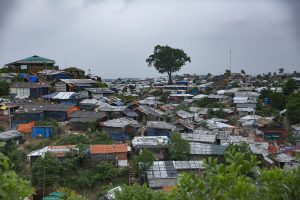United Nations Secretary-General Antonio Guterres has called on Myanmar’s military-installed government to include the country’s embattled Rohingya population in any solution to the country’s ongoing political crisis.
In a statement issued yesterday, U.N. spokesperson Stephane Dujarric said Guterres noted “the unflagging aspirations for an inclusive future” for the Rohingya, and said that “the full and effective participation of the Rohingya people was an inherent part of a Myanmar-led solution” to the country’s current conflict.
Myanmar has slipped into dysfunction and conflict since the military coup d’etat of February 2021, which has prompted an increasingly zero-sum struggle between the military administration and a polycentric resistance movement that includes civilian militias and established ethnic armed groups.
Guterres’ statement was one of a number issued yesterday to mark the fifth anniversary of the brutal Myanmar military assault that drove more than 700,000 Rohingya civilians into Bangladesh. The violent expulsions, which U.N. experts later claimed showed evidence of “genocidal intent,” brought the number of refugees in southeastern Bangladesh to more than 1 million. There they remain five years on, confined to heaving refugee camps, with little hope of relocation, either back to Myanmar or to third countries.
The military coup and the ensuing chaos have further complicated any resolution of the Rohingya refugee crisis. Even before then, not even a single Rohingya refugee had been voluntarily repatriated to Myanmar, given the stonewalling of Myanmar’s civilian government and the outbreak of civil war between the military and the Arakan Army in Rakhine State in 2018.
In his statement, Guterres’ spokesperson echoed the calls of human rights groups and others that even amid the current crisis, it was “critical that the international community continue to seek comprehensive, durable, and inclusive solutions to the crisis” facing the Rohingya. At the same time, he said that “perpetrators of all international crimes committed in Myanmar should be held accountable,” and said that “justice for victims will contribute to a sustainable and inclusive political future for the country and its people.”
Movement in this direction is unlikely. While the opposition National Unity Government (NUG), which is spearheading the resistance to the military junta, has pledged to bring treat the Rohingya as lawful and legitimate members of the national community, any solution to the crisis sits downstream of a resolution to the current crisis. And as long as the military remains in even nominal control of the country, the slim chance of repatriations will narrow to nothing.
As Reuters reported earlier this month, researchers at the Commission for International Justice and Accountability (CIJA) have now amassed ample evidence of the premeditated nature of the military’s assaults on the Rohingya in August 2017.
Over the past few years, Reuters reported, CIJA has assembled a trove of 25,000 pages of official documents that investigators believe proves the premeditated nature of the military’s assaults. “The documents show how the military systematically demonized the Muslim minority, created militias that would ultimately take part in operations against the Rohingya, and coordinated their actions with ultranationalist Buddhist monks,” Reuters reported. The cache of documents, the news agency added, “illustrates the obsession authorities had with reducing a population they viewed as an existential threat.”
For this reason, Guterres’ call for accountability was marked by a paralyzing circularity, given that the very people who head the military junta are also those most responsible for the violent ethnic cleansing of the Rohingya – and the least likely to support efforts at justice. The melancholy reality is that the only chance of an amelioration of the massive humanitarian crisis in Bangladesh, let alone the genuine inclusion of the Rohingya in Myanmar society, lies through a stable resolution to Myanmar’s political crisis – a solution that currently seems very far off.

































